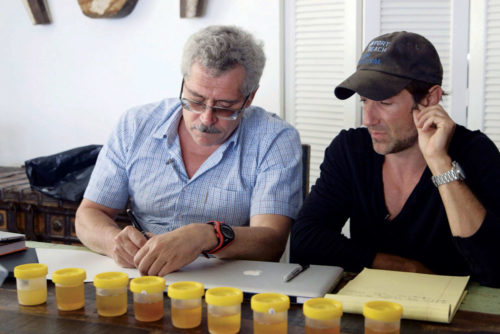
Follow “Indie Prof” on Facebook for updates about film events and more reviews. Each month the Indie Prof reviews films in theaters and on DVD or streaming services.
Thelma (2017)

Thelma
We critics love to categorize films: “a psychological puzzle,” “sci-fi,” a “coming-of-age story,” “a supernatural thriller.” Such labels can sometimes be reductive and fall short of capturing the various nuances of a film; still, we love them and use them freely, mostly as shorthand. I will do no such thing with the wonderful new Norwegian film from director Joachim Trier, Thelma. Rather, I will label it as “all of the above.”
The film tells the story of young Thelma, who is just off to college for her freshman year and the first time away from her overbearing, devout, Christian parents. She soon struggles with her intense feelings for another young woman (which run counter to her faith), and that’s when things start to get strange. Whenever she fights off her feelings, or urges, she falls into something akin to an epileptic seizure. She sees doctors who finally tell her that she may have a psychokinetic condition—one which allows her to move things with her mind. This happens when she is attempting to suppress her feelings. She then uncovers secrets from her past, and we realize that everyone may not be who/what they seem.
Joachim Trier is a talented director who has made a string of excellent films, including Oslo August 31st, and Louder than Bombs. He is a master storyteller, and in the tradition of great Norwegian films, he is able to quietly display the psychology of his characters through the filmic apparatus, particularly the cinematography and editing. His films remind of another great director of thrillers, one Alfred Hitchcock, and Thelma is very much in the vein of the master. The performances in the film are particularly good, especially Eili Harboe as the titular character. She begins the film as a blank slate that envelops the audience as her character moves in different directions. The film follows along.
And oh yeah, it has one of the most arresting—and disturbing—opening scenes I’ve seen in a long, long time. Make sure you are ready from the start for this one.
You will like this film if you enjoyed The Girl with the Dragon Tattoo, Twin Peaks, and/or Psycho.
Starts Jan. 5 at the Sie Film Center.
Icarus (2016)

Icarus
Most documentary filmmakers will say they start out with an idea for a film that changes, sometimes drastically, once they start working on the project. Icarus is a case in point: what started out as a film to address the doping issue in the world of cycling took a hard turn into a very contemporary film about politics, world amateur sports, and international intrigue. And that is not hyperbole.
Director Bryan Fogel is a filmmaker who was also the creator of the popular Jewtopia play and subsequent film of the same name. Icarus took shape as a vehicle for Bryan to track his own progress as a competitive amateur cyclist. He wanted to see if he could beat the doping test in the famous Haute Route, a race that is known as the amateur Tour de France. He was introduced to Grigory Ridchenkov, the head of Russia’s anti-doping system, and Ridchenkov helped him begin a program of hormone injections and steroid use. When he finally gets to the race, Vogel finds that his performance is not really enhanced, and his experiment is essentially anticlimactic.
That’s exactly where the story gets interesting. Fogel and Ridchenkov become fast friends, and the mercurial Ridchenkov quickly becomes the star of the film. Fogel visits Russia, and Ridchenkov visits Los Angeles. Their Skype talks are even interesting. But then the film quickly turns darker as Ridchenkov gets swept up in an investigation by the World Doping Administration (WADA) and is summarily dismissed from his position in the Moscow lab. As he tells more of his story and we find out about his role in Russia’s doping program, his situation becomes more tenuous. He finally flees Russia (in a tense, suspenseful scene) for the United States and moves in with Fogel. He soon meets with the U.S. Department of Justice and tells his story to The New York Times. News reports of mysterious deaths of friends come out of Russia. His family is hounded. He fears for his life.
All this began with a bike race. It then turned into a very timely story of how far Russia will go to achieve excellence and dominate the world stage—in this case, sports, but it has larger implications for our current political climate. The film is both engaging as well as a true cautionary tale for our times. You can bet it will make an appearance at the Oscars.
You will like this film if you enjoyed The Cove, Exit Through the Gift Shop, and/or Blackfish. Now playing on Netflix.
Vincent Piturro, Ph.D., is an associate professor of Cinema Studies at Metropolitan State University of Denver. He can be reached at vpiturro@msudenver.edu.



0 Comments